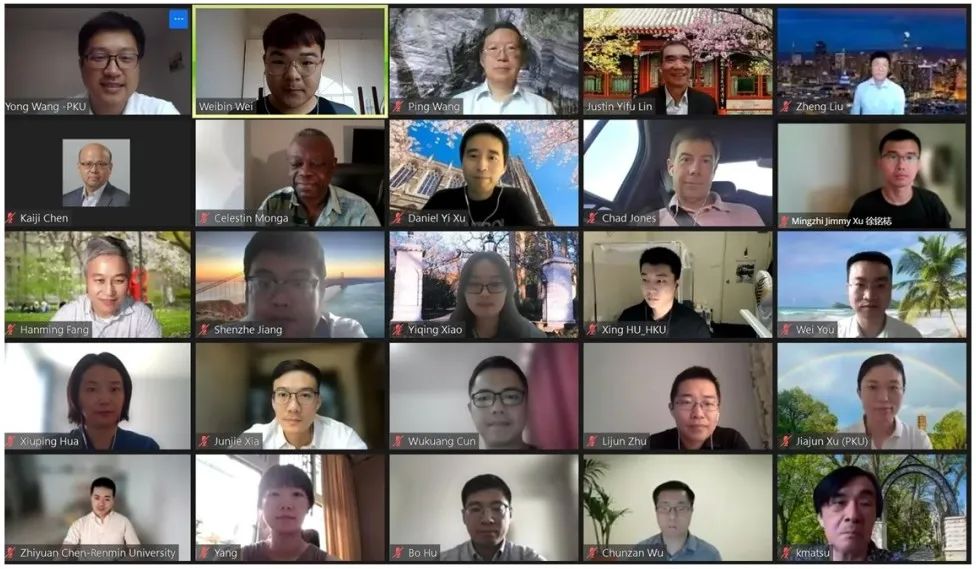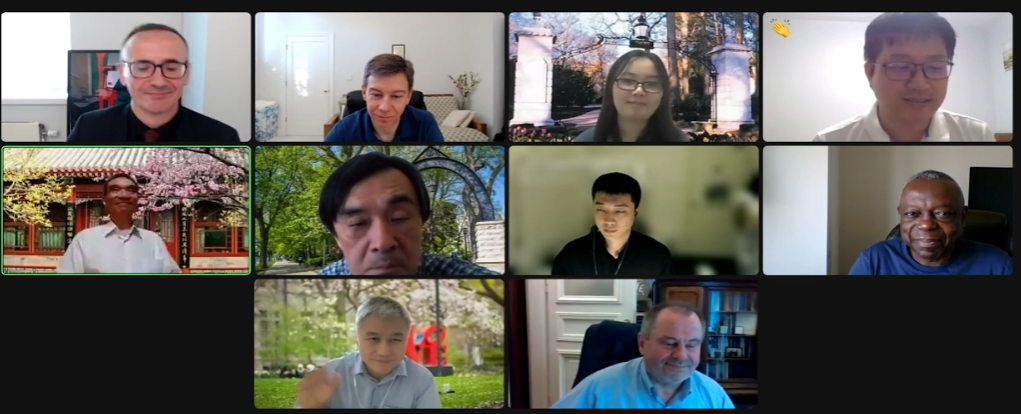英文首页﹀
The Ninth International Workshop on NSE Successfully Concluded
2022-08-09
The Ninth International Annual Workshop on New Structural Economics (NSE) was successfully held online on August 2, 2022. The Workshop, hosted by the Institute of New Structural Economics (INSE) at Peking University, brought together worldwide scholars to exchange research ideas and findings on three main subjects including “Resource Allocation, Productivity, and Market Efficiency”, “Regions, Industries, and Macroeconomics” and “Growth and Political Economy.”
At the opening session on August 2, Professor Justin Yifu Lin, Dean of INSE at Peking University, gave a short opening remark, expressing sincere gratitude to the participants for their support during the epidemic and the prospect of the development of new structural economics. Associate Professor Yong Wang, Academy Deputy Dean of INSE at Peking University and Secretary-General of New Structural Economics Research Consortium, chaired the opening session.

In the morning of August 2, Beijing time, session A “Resource Allocation, Productivity, and Market Efficiency” was chaired by Junjie Xia, Associate Professor at Central University of Finance and Economics and Visiting Assistant Professor of INSE at Peking University. Five papers were discussed in this session.
Daniel Yi Xu, Professor at Duke University,presented a paper entitled“Regulating Conglomerates in China: Evidence from an Energy Conservation Program”. Using detailed firm-level data and a difference-in-differences research design, this paper studies the impact of a prominent energy regulation policy on the output and production efficiency of regulated large Chinese manufacturers, and estimates the social welfare effect of this policy. Assistant Professor Chen Zhiyuan of Renmin University of China gave comments.
Johannes Van Biesebroeck, Professor at KU Leuven University, presented a paper entitled “Productivity, Exporting, and Financial Constraints of Chinese SMEs”. This paper discusses the productivity improvement that SMEs' export behavior may induce through the realization of scale economies. They find that trade credit restricted the expansion of SMEs in the domestic market. After entering the export market, small enterprises with a large amount of trade credit expanded their sales the most. Professor Miaojie Yu of Peking University made comments on this paper.
Jie Bai, Assistant Professor at Harvard University, presented a paper entitled “Stand out from the Millions: Market Congestion and Information Friction on Global Ecommerce Platforms”. This paper studies the role of market congestion and information friction in global e-commerce and their interaction with onboarding initiatives. The results imply the need for more effective policies in this area. Associate Professor Ying Fan of University of Michigan commented on this paper.
The paper “China’s Monetary Transmission and Systemic Risk: A Role of Interbank Bond Markets” was presented by Yiqing Xiao, Assistant Professor of INSE at Peking University. This paper studies how interbank wholesale funding in China influenced monetary policy transmission under a dual-track interest-rate system and how it contributed to the increasing systemic risks in recent years. Assistant Professor Wukuang Cun of Shanghai University of Finance and Economics discussed this paper.
Lijun Zhu, Assistant Professor of INSE at Peking University, presented a paper entitled “Unequal Transition: The Making of China’s Wealth Gap”. This paper provides a unified framework that includes the key features of economic transition and reforms to assess quantitatively the mechanism behind the dynamics of wealth inequality in China. Yang Tang, Assistant Professor at Nanyang Technological University, gave her comments.
In the afternoon, Session B “Regions, Industries, and Macroeconomics” was chaired by Lijun Zhu, Assistant Professor of INSE at Peking University. Five papers were discussed at this session.
Dr. Zheng Liu from Federal Reserve Bank of San Francisco started the session with a paper entitled “Bank Risk-Taking, Credit Allocation, and Monetary Policy Transmission: Evidence from China”. The paper finds that banks reduced risk-taking by increasing the share of lending to SOEs, both on average and conditional on monetary policy expansions. Credit misallocation between SOE and POE reduced aggregate productivity, which partially offset the expansionary effects of monetary ease. Yiqing Xiao, Assistant Professor of INSE at Peking University discussed this paper.
Keun Lee, Professor at Seoul National University, presented a paper entitled “Varieties of Regional Innovation Systems (RIS) around the World and Catch up by Latecomers: Identifying Two Types of Catching RIS”. This paper raises the question of why the economic performance and growth trajectories differed among three Asian regions, namely, Taipei, Shenzhen, and Penang. Xiuping Hua, Professor of Nottingham Ningbo China discussed this paper.
Ping Wang, Professor at from Washington University in St. Louis, presented a paper entitled “Rural-Urban Migration and Informality: An African Story”. This paper uses a model where the workers and the firms are variant and discusses the migration and occupation choices of rural workers and the entry decision of potential firms. Charles Leung, Professor from City University of Hong Kong, discussed this paper.
Dr. Haochen Zhang from Peking University presented a paper entitled “Agricultural Endowment and Structural Transformation”. This paper uses data from 34 countries and finds a negative association between agricultural endowment per capita and structural transformation over the past few decades. This paper then proposes the opportunity cost hypothesis to explain this fact. Loren Brandt, Professor from University of Toronto, discussed this paper.
Loren Brandt, Professor from University of Toronto, presented a paper entitled “Barriers to entry and regional economic growth in China”. This paper studies the growth patterns of the non-state sector across localities in China and builds a model of new firm entry with multiple distortions. Yifan Zhang, Professor from the Chinese University of Hong Kong, discussed this paper.
In the evening, Session C " Growth and Political Economy " was chaired by Yiqing Xiao, Assistant Professor of INSE at Peking University. This session includes five papers.
Xiaobo Zhang, Professor at Peking University,presented a paper entitled “Small and Medium Enterprises Amidst the Pandemic and Reopening: Digital Edge and Transformation.” Using administrative and universal firm registration data as well as the offline and online surveys of small businesses in China, the paper examines whether digitization helped Small and Medium Enterprises (SMEs) better cope with the COVID-19 pandemic, and whether the pandemic spurred the digital technology adoption. Professor Yi Huang at Fudan University gave his comments.
Michele Boldrin, Professor at Washington University in St. Louis and Member of the Academic Advisory Council of INSE at Peking University, presented a paper entitled “Tolerance and Stubbornness: Modelling Political and Media Populism.” They study the interplay of stubbornness and tolerance in a context of choice. They also discussed how stubbornness and tolerance determine that choice and how market structure affects that choice. Professor Jie Zheng at Tsinghua University commented on the paper.
Dr. Xiaoyue Zhang from Tilburg University presented a paper entitled “Misallocation under Heterogeneous Markups and Non-Constant Returns to Scale”. This paper studies how equalizing the marginal revenues of capital and labor affect the labor share in developing countries, and how to introduce heterogeneous markups without imposing an ex ante correlation between markups and market shares. Dimitrije Ruzic, Assistant Professor at INSEAD, discussed the paper.
Hanming Fang, Professor at University of Pennsylvania, presented a paper entitled“The Downside of Tournament-Style Political Competition: Evidence from China”. This paper studies whether political competition affects local politicians’ incentives and results in inefficiency when they decide on the economic policies, and whether the career incentives of local politicians will be internalized by firms in their decisions of where to invest, and they shape the landscape of internal economic integration in a country. Xi Weng, Professor at Peking University, commented on the paper.
Charles I. Jones,Professor at Stanford University, reported a paper titled “Recipes and Economic Growth: A Combinatorial March Down an Exponential Tail.” This paper answers the classical question--the relationship between the exponential growth and the Pareto distribution--by demonstrating that combinatorial growth in the number of draws from standard thin-tailed distributions leads to exponential economic growth. Professor Akos Valentinyi from the University of Manchester commented on the paper.

At the end of the conference, Professor Justin Yifu Lin expressed his sincere thanks to all the participants and highly praised the quality of the papers and discussions. And he keenly looked forward to working with the colleagues in the future to continue to make efforts to promote further research on economic structure and structural transformation.
INSE held its Fifth Academic Advisory Council Meeting on August 3rd. Yong Wang, Academic Deputy Dean of INSE at Peking University and Secretary-General of New Structural Economics Research Consortium, chaired the meeting. At the beginning of the meeting, Professor Justin Yifu Lin introduced the research agenda of INSE. Members of the Academic Advisory Council then offered insightful suggestions for the future development of INSE.
The Academic Advisory Council of INSE, composed of internationally-renowned scholars and experts, meets annually and provides advice on INSE's research activities. Attendees this year included Ann E. Harrison, Dean of the Haas School of Business at University of California, Berkeley; Gene M. Grossman, Jacob Viner Professor of International Economics at Princeton University; Charles I. Jones, STANCO 25 Professor of Economics at the Graduate School of Business at Stanford University and a Research Associate of the National Bureau of Economic Research; Celestin Monga, Visiting Professor at Harvard University; Kiminori Matsuyama, Professor of Economics at Northwestern University; Alojzy Z. Nowak, Vice-rector of University of Warsaw; Roger Myerson, the David L. Pearson Distinguished Service Professor of Global Conflict Studies in the Harris School of Public Policy and the Griffin Department of Economics at the University of Chicago; Finn Tarp, Danish Professor of Development Economics at the University of Copenhagen and Ping Wang, Seigle Family Professor at Washington University in St. Louis.
Written by Weibin Wei, Xiangrui Zhao

